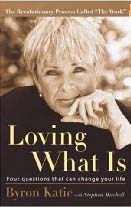
 Loving What Is
Loving What IsFour Questions That Can Change Your Life
Review posted March 29, 2009.
Harmony Books (Random House), New York, 2002. 258 pages.
Starred Review
Sonderbooks Stand-out 2009: #4 Nonfiction: True Stories
Loving What Is is hard to describe. It doesn't quite fit into the box of any religion or philosophy I might try to fit it into. In my view, this is a tool that a person from any religion can use to move further along their own spiritual path.
The title probably says it best. With her process, Byron Katie shows you how to begin to stop arguing with reality and start loving what actually is happening in your life.
Katie doesn't tell you what to think. The Work she presents consists of four questions you ask yourself. She doesn't tell you how to answer them.
You start with a stressful thought. She even suggests you fill out a Judge Your Neighbor worksheet to find thoughts you are thinking that are causing you stress. I can use the example, "My husband should not have left me."
Question One is: Is it true?
It's a simple question, and usually our gut reaction is Yes, of course it's true! In my example, the Bible even says that he was sinning, so of course he should not have done that. He hurt people, didn't he?
Question Two asks, Can you absolutely know that it's true?
This question takes you deeper. After all, what do I mean by "should"? I've got a much closer relationship with God than I did before my husband left. I'm happier and healthier, and am enjoying pursuing my own interests and passions more than I was able to when I was living as a wife. Can I absolutely know that he should not have left me?
Question Three asks, How do you react when you think that thought?
For my example, the answer's easy. When I think the thought, "My husband should not have left me," I get angry and sad. I start wanting some kind of compensation. I feel sorry for myself. I want to make him change. Bottom line, none of those reactions make me feel good.
Question Four asks, Who would you be without the thought?
Notice that she doesn't tell you to give up the thought! Katie's far more gentle than that. She just asks you to envision what you would be like without the thought. In my example, I'd be happier, freer, and much more satisfied with my life now. I'd have a lot more joy in the present.
Finally, she follows up the questions by suggesting that you look at "the Turnaround" and see if that statement might be even more true.
In my example, "My husband should not have left me," there are at least three turnarounds:
I should not have left me.
I should not have left my husband.
My husband should have left me.
Just looking at the first one, when I'm in my husband's business, brooding about what he should have done, aren't I in that moment leaving myself?
Besides that, I can't do anything about what my husband does, only about what I choose to do and think.
My example is not as complete as the many examples given in the book of people from a wide variety of circumstances going through the four questions with Katie's help.
I find my resistance to the ideas here is mainly centered on the idea that no one "should" sin. I don't like the turnaround "My husband should have left me," because it sounds like condoning sin or calling evil good. (How arrogant I sound even admitting that!)
I can deal with it better when I realize that Katie's ideas greatly help to get me to a Joseph place: "You meant it for evil, but God meant it for good, to accomplish what is now being done." After all, if I am happier and healthier than before my husband left me, what is there still to be angry with him about? Who am I to get hung up on what he should or should not do? What business is that of mine anyway?
This is why I think that Katie's ideas can be helpful for anyone from any religious background. Unless that religion encourages you to judge your neighbor -- but I don't think there are many of those out there!
She helps you examine what you are thinking and how that fits with reality. You can become much more joyful about what actually is happening to you.
Definitely ideas worth thinking about!

